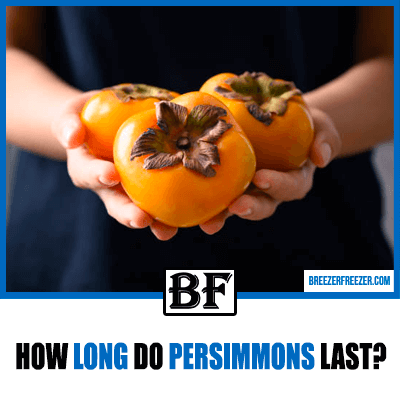How long do Persimmons last?
Persimmons have so many health benefits, but you rarely see this fruit in the grocery store or farmers’ market, but when you do, be sure to buy persimmons. They are incredible fruits. Persimmons help with hypertension and are excellent for diabetes, and they make a good snack that is full of fiber and will keep you satiated. But are persimmons delicate with a short shelf life?

These incredible fruits have been used for centuries by the Japanese and Chinese as a delicious fruit and a way of curing ailments such as excessive bleeding and liver damage and for permanent weight loss.
In this article, we will look into this incredible fruit and give you the lowdown on storing it correctly so you can enjoy it for more than a few days. We answer frequently asked questions bringing you insight into storing persimmons.
Let’s get into it.
Do persimmons expire?

Yes, very quickly. If you have ripe persimmon in the home, it will last for a couple of days before it becomes inedible and becomes a sweet, mushy semi-liquid.
When persimmons become overripe, you may be tempted to throw the fruit in the garbage, but it can still be eaten. Grab a spoon, dig into the overripe fresh fruit, and enjoy the fruit’s benefits and sweetness.
If you have unripe persimmon that is green and hard, don’t be tempted to take a bite, it will be bitter and astringent, making your mouth pucker as if you have just kissed the ugliest person you know.
Regardless of the variety of persimmon, it’s okay to eat with a spoon if it’s overripe.
Even freshly harvested persimmons have a short shelf life. You buy them from the grocery store, bring them home, and they are overripe within two days. Is it possible to make this fruit last longer?
The best way to circumvent the problem of overripe persimmons is to buy fruit that is not ripe, place it in the fridge, and wait for the fruit to ripen. At least you have some kind of control over the life of the fruit.
Do persimmons need to be refrigerated?
They say the best way to store persimmons is at room temperature, but that does negate some of your control over the ripening process so place ripe persimmons in the fridge. It will not slow the ripening process, but the fruit tastes delicious when cold.
The problem is ripe persimmon should be consumed within a day or two of harvesting. This makes it hard to buy many beautiful super fruits with many health benefits.
Keeping persimmons in the fridge that are not ripe seems the way to go. Finally, you have some control over when the food perishes within reason.
What do you do if you have lots of persimmons?

Before we get into that, it is worth knowing there is more than one type of persimmon.
The two primary varieties of persimmons: are hachiya and fuyu. The fuyu is spherical and squat, almost resembling an orange tomato. Before they get entirely soft and mature, they can be eaten crisp.
These are the persimmon varieties that work well in salads and other recipes as snacks.
Hachiya persimmons are astringent unless they are eaten soft and ripe; as a result, they are not good in fresh salads, but they perform well in baking, jams, and jellies because of their very soft textures. They can be used in both savory and sweet cuisines, making them quite versatile.
Here are five suggestions for using persimmons.
- If you have a lot of persimmons, it makes sense to use them instead of letting the fruit rot, so break out the smoothie blender and get creating smoothies. They will last a day in the fridge, so at least you have attempted to extend the shelf life.
- Use them at breakfasts with your rt cereal. If you like to have fresh fruit mixed in with your breakfast cereal, persimmon is going to be for you, it will keep you feeling full throughout the day, and it is loaded with essential vitamins and minerals.
- Break out the winter salad and breathe some life into it with glorious persimmons. They are the perfect contrast to robust flavors from calabrese lettuce, onions, and anything else in the salad, and it’s a perfect contrast of flavors that will bring your salad alive.
- Persimmons are the perfect addition to baking and can easily replace other fruits you may introduce into your cakes, such as bananas and raisins. Add some persimmon to bring the taste buds alive.
- Persimmons make the perfect snack any time of the day. You can pull quartered persimmons from the fridge and tuck them in as you take your mid-afternoon break.
Do persimmons go bad if they sit out?
They will go bad and generally have a short shelf life, but it depends somewhat on the variety of persimmon you are dealing with.
Fuyu persimmons look a lot like tomatoes, but they are firm and semi-sweet. You can store this variety of persimmon in the fridge for weeks, 4 weeks to be precise, and the fruit will be acceptable to eat.
Haychias is a softer fruit, but if they are bought from the grocery store when not ripe, they can also be placed in the fridge extending the shelf life up to 3 weeks.
However, it is recommended that permissions are stored at room temperature. Haychias will last for a couple of days if ripe, and Fuyu, possibly a week when left out.
If you are storing permissions at room temperature, make sure they are covered with cling wrap to keep insects away and prevent bacteria from settling on the fruit.
How long do persimmons last in the fridge?

It depends on what ripe state they have reached and which variety you have. Haychia is the softer of the two fruits and should be consumed within a couple of days when ripe. Storing ripe haychia persimmons in the fridge will not extend their shelf life.
On the other hand, catch the haychia at a semi-ripe stage, and you could store it in the fridge for three weeks without problems.
Fuyu persimmons are a firmer fruit even when ripe, but select a semi-ripe fruit that could stay in the fridge for a month or more.
If you are storing persimmons in the fridge, don’t wash them and store them in a plastic bag.
Does frozen persimmon go bad?
Persimmon freezes well. You can freeze persimmons for three months without problems in the freezer. You will have some options, such as how to prepare the persimmons for freezing. Will you peel the fruit? Leave it whole or slice it into segments; there is no right or wrong way of freezing persimmons.
The excellent news is that freezing ripe persimmons does not affect their condition. It will not increase the rate of the fruit ripeness but just preserve the fruits in ice.
After a few months of continuous freezing, the fruit will degrade. The flesh of the fruit will turn to mush, not because it is bad but due to the ice crystal formation in the delicate flesh that has been cut and sliced and crushed the flesh of the fruit.
This is normal for fruits with a delicate structure. Even fruits that are more robust end up in the same condition.
Once the ice effectively purees the fruit, there is only one actual use for it: to make smoothies and enjoy the flavor of the fruit.
How do you thaw persimmons?
If you are thawing persimmons that have retained their texture after fast freezing, thaw them in the fridge. Thawing slowly is always the way to go.
The persimmons will thaw completely overnight if they are not stacked and can be enjoyed for breakfast.
If you are in a hurry, then you could place them in the microwave but be careful not to zap them for too long, causing them to steam.
How do I know if my persimmon is bad?
Like all fruits, they do eventually go bad. Persimmons are no different, exhibiting tell-tale signs that they should not be eaten.
The tell-tale signs are pretty evident. If the flesh is wrinkled, this indicates the fruit has lost a lot of moisture and is going bad. The texture has changed, there may be a peculiar smell, and the fruit will look like it’s seen better days. If this is your fruit, throw it in the garbage immediately.
Related:
- How long does dragon fruit last?
- How long does jackfruit last?
- How long does cassava last? How to keep these root vegetables fresh
- How long does Zucchini last?
- How long does Tamarind last?
- How long does Jicama last?
- How long do mangosteens last?
- How long does Guava last? Tips to keep them fresh
- How long does Soursop last?
- How long does Lychee last?
- How long does Longan last?
- How long does custard apple last? Tips to keep them fresh longer
- How long do Mangoes last? Tips to keep them fresh
Final thoughts
Persimmons are delicate fruit with a short shelf life, but it depends significantly on your variety. It is recommended to store persimmons at room temperature, but they can be stored in the fridge to extend their short edible life.
Freezing persimmons brings an exciting opportunity to extend the life of the fruit for up to 3 months and beyond in some cases.
However, freezing ripe fruit will not prevent the fruit from becoming mushy. It may exacerbate the problem with ice crystal formations in the delicate flesh of the fruit.





